中小学英语:“it”用法详解
小学英语英语代词及答案及解析

小学英语英语代词及答案及解析一、选择题1.—Do you have ________else to say for your mistake?—________but sorry.A.anything; Something B.something; EverythingC.anything; Nothing D.something; Anything2.—Sam, there are so many spelling mistakes in your paper. You should try not torepeat________.—Sorry, Mr. White. I'll be more careful from now on.A.it B.its C.them D.theirs3.Life is like a one-way street. ________ will happen________ the same way again. A.Nothing; by B.Nothing;/ C.None; in D.None;on 4.Believe in yourself. Do this and no matter where you are, you will have ________ to fear. A.nothing B.something C.anything D.everything 5.—Why did your family buy a second-hand car?—We couldn’t afford a new one, but even an old one is better than ________.A.none B.either C.nothing D.neither 6.Robots are created by humans for humans. There’s ________ to be afraid of. A.something B.nothing C.everything D.anything 7.Wait a minute. I have ________ more to tell you about the travelling plan. A.something B.everything C.anything D.nothing 8.Alice was very happy to see that the children were enjoying ________.A.himself B.herself C.ourselves D.themselves 9.—This book on animals is interesting. I’d like ________. Where did you buy it, Simon?—In the bookshop near my school.A.it B.this C.that D.one10.They all think ________ to create such beautiful music with the transparent cups.A.it amazed B.that amazed C.it amazing D.that is amazing 11.—The apples are quite delicious! Can I have one more?—Sorry, there is ________ left, what about some oranges?A.none B.no one C.nothing D.nobody 12.—If you are buying today's Suzhou Daily, could you get ________ for me?—I'm glad to help you.A.it B.this C.one D.that13.My mother tried to cook ________ for me when I studied in New Zealand.A.different something B.different anything C.something different D.anything different 14.I can take good care of myself. I do not depend on ________.A.anybody B.everybody C.nothing D.something 15.The young should learn how to look after ________ and be more independent.A.they B.them C.their D.themselves16.It’s known to all that the Chinese are famous for ________ hard work and wisdom. A.they B.them C.their D.themselves 17.Miss Liu is kind enough to help us whenever she is needed. We all like ______.A.she B.her C.him D.them 18.—Are these cars made in Japan?—Yes, and they’re much cheaper than ___________ in American.A.that B.those C.it D.ones19.Your home town is really nice!The air quality is as good as______of Sanya.A.it B.one C.that D.the one 20.—Is this ________ bike?—No, it isn’t. I left my bike at home.A.my B.your C.his D.her21.As the old saying goes, politeness costs nothing and gains ________.A.nothing B.anything C.everything D.something 22.Some friends tried to calm down Mr. and Mrs. White and help solve their problem without hurting the feeling of ________, but failed.A.none B.either C.both D.neither23.He thinks himself ________, but we think him ________.A.somebody, anybody B.somebody, nobody C.anybody, somebody D.anybody, nobody 24.They have provided several ways to solve the problem. We can choose _________ to start with.A.it B.that C.one D.each25.Wu Xinhai, a stay-at-home dad, said “I want my kids to have a different childhood from ________.”A.me B.mine C.myself D.I26.—Are your parents angry with you about your English?—Oh, ________ of them is angry. They just told me to get better grades next time.A.none B.both C.neither D.either27.— Who was calling you on the phone just now?— ________ was my mum.A.She B.That C.It D.This28.— There are more TV series than before.—That’s true. But ________ was to my taste. I prefer westerns.A.all B.few C.some D.none 29.—Today’s Yangtze Evening, please.—There’s only one copy left. Would you like ________?A.they B.them C.it D.one30.— When would you like to go to Nanjing Garden Expo (园博园) with me, this Friday or Saturday?— ________. I am free only this Sunday.A.Both B.None C.Neither D.Either 31.—Jeffrey always remained calm and mastered his own feelings.—No wonder he is a ________.A.somebody B.anybody C.nobody D.everyone 32.—Though the film Hi, mom has achieved a great success, it isn’t liked by ________.—I think so. It is hard to please all.A.nobody B.somebody C.everybody D.anybody 33.—Excuse me, I want to buy a birthday gift for my brother.—Here are some gifts for boys. You can choose ________ for him.A.it B.one C.that D.them 34.—Tickets for Friday.—Sorry, we’ve got ________ left.A.none B.nothing C.no D.no one 35.—David, I have ________ to tell you.—Great! I’m excited to hear our country ha s made progress in exploring the space. A.something important B.anything important C.important something D.important anything36.—He was the strong silent type.—Yes. He thought ________ better to say nothing.A.it B.its C.it’s D.itself37.We found ________ easy to finish the task by working as a team.A.it’s B.that C.this D.it38.—Are there any air tickets to Hong Kong?—Sorry. There is ________ left.A.nothing B.none C.nobody D.no one 39.—Daniel, is this your mobile phone?—No. ________is on the table.A.I. B.me C.my D.mine40.The new workshop can not only help students learn different skills but also teach _________ to care about others.A.they B.them C.their D.themselves【参考答案】一、选择题1.C解析:C【详解】句意:——对于你的错误你还有什么要说的吗?——只有抱歉。
小学英语精讲精析 Is it a pear
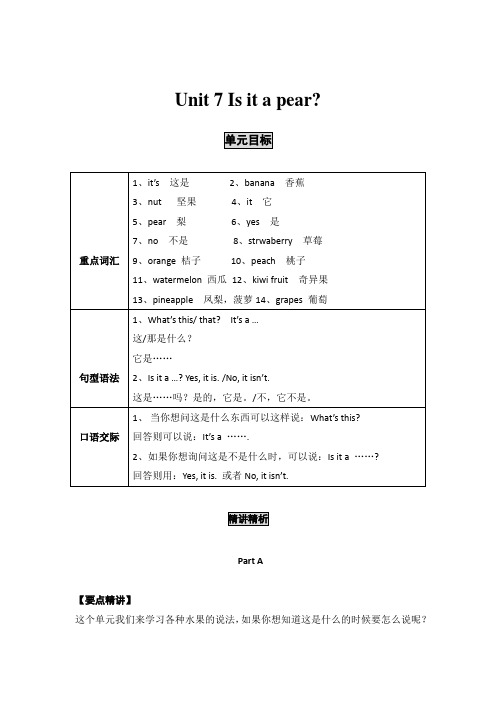
Unit 7 Is it a pear?Part A【要点精讲】这个单元我们来学习各种水果的说法,如果你想知道这是什么的时候要怎么说呢?下面我们就来了解一下英语中询问“是什么”的说法。
1、 What’s this /that?如果你想问“这是什么东西”或者“那是什么东西”时就可以用上这个句子。
回答则可以用:It’s a ……那是……。
Thisadj.这, 这个, 今, 本 pron.这, 这个 thatadj.那, 那个pron.那, 那个 2、Is it a ……?如果你想询问“这是……吗?”可以说:Is it a ……? 回答则可说: Yes, it is.或者No, it isn’t.【针对训练】一、辨一辨,标一标。
(快来为划线部分的发音作一下判断,相同的标、不同的标。
)1.2.3.4.babyballbooklookpenhenpearhear二、连一连,词汇练习。
(请帮小狗把单词和他们的汉语意思用直线连接起来)1.pencil2. pen3. baby4. bagA:书B:钢笔C:是的D:球E:铅笔F:它是G:婴儿H:书包5. book6. ball7. it’s8. yes三、补一补,根据图片提示完成句子。
1. —What’s this?—It’s .2. —What’s that? —It’s .3. —What’s that? —It’s .4. —What’s that? —It’s .5、—What’s this? —It’s .四、读一读,判一判。
(根据图片提示,判断句子的正误。
正确在句子前面的括号里划 ,错误划 )()1. —Is this a peach?—Yes,it is.()2. --Is this a strawberry.--Yes,it is.()3. —Is it a lemon.—No,it isn’t.()4. —Is it a pear?—Yes,it is.()5.--Is this a orange?--No,it isn’t.五、读一读,选一选。
小学英语精讲精析 It’s mine.
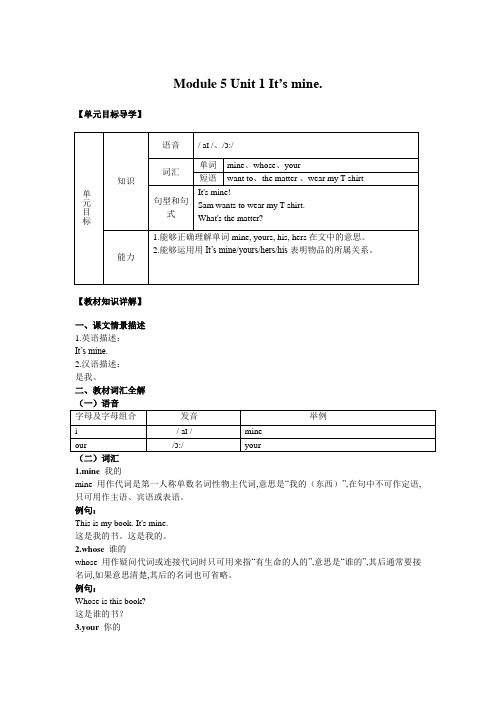
Module 5 Unit 1 It’s mine.【单元目标导学】【教材知识详解】一、课文情景描述1.英语描述:It’s mine.2.汉语描述:是我。
二、教材词汇全解(一)语音(二)词汇1.mine我的mine用作代词是第一人称单数名词性物主代词,意思是“我的(东西)”,在句中不可作定语,只可用作主语、宾语或表语。
例句:This is my book. It's mine.这是我的书。
这是我的。
2.whose 谁的whose用作疑问代词或连接代词时只可用来指“有生命的人的”,意思是“谁的”,其后通常要接名词,如果意思清楚,其后的名词也可省略。
例句:Whose is this book?这是谁的书?3.your 你的your是第二人称形容词性物主代词,单复数同形,在句中用作定语,也可用作动名词的逻辑主体。
例句:These are your books.这些是你们的书。
三、课文内容全译四、课文句型讲解1. It's mine!这是我的!mine 是I的名词性物主代词例句:Mine is new.我的是新的。
2. whose T-shirt is it? 这是谁的T恤?Whose是who的所有格形式,意为“谁的”,whose用来对物主代词及名词所有格进行提问。
例句:Whose is that bedroom?这是谁的卧室?【相关话题拓展】名词性物主代词的句法功能1. 作主语,例如:作主语,例如:May I use your pen? Yours works better. 我可以用一用你的钢笔吗?我可以用一用你的钢笔吗?2. 作宾语,例如:作宾语,例如:I love my motherland as much as you love yours. 我爱我的祖国就像你爱你的祖国一样深。
我爱我的祖国就像你爱你的祖国一样深。
3. 作介词宾语,例如:作介词宾语,例如:Your should interpret what I said in my sense of the word, not in yours. 你应当按我所用的词义去解释我说的话,而不能按你自己的意义去解释。
it的用法总结
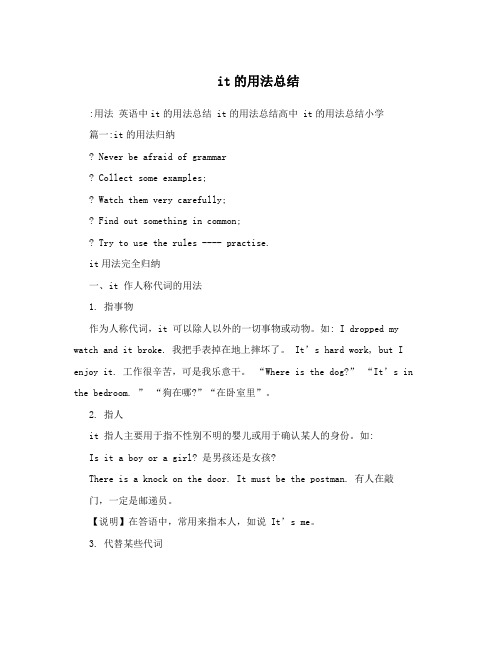
it的用法总结:用法英语中it的用法总结 it的用法总结高中 it的用法总结小学篇一:it的用法归纳Never be afraid of grammarCollect some examples;Watch them very carefully;Find out something in common;Try to use the rules ---- practise.it用法完全归纳一、it 作人称代词的用法1. 指事物作为人称代词,it 可以除人以外的一切事物或动物。
如: I dropped my watch and it broke. 我把手表掉在地上摔坏了。
It’s hard work, but I enjoy it. 工作很辛苦,可是我乐意干。
“Where is the dog?” “It’s in the bedroom. ” “狗在哪?”“在卧室里”。
2. 指人it 指人主要用于指不性别不明的婴儿或用于确认某人的身份。
如:Is it a boy or a girl? 是男孩还是女孩?There is a knock on the door. It must be the postman. 有人在敲门,一定是邮递员。
【说明】在答语中,常用来指本人,如说It’s me。
3. 代替某些代词代词 it 还可用于代替指示代词this, that 以及复合不定代词 something, anything, nothing等。
如:“What’s this?” “It’s a new machine. ” “这是什么?”“是一种新机器”。
Nothing is wrong, is it? 没出什么问题,是吗?二、it 作非人称代词的用法1. 基本用法it 作非人称代词的用法,主要用于指时间、距离、价值、天气、气候及温度等自然现象。
如:It’s too late to go there now. 现在去那儿已经太迟了。
小学英语语法知识点:it 的用法!
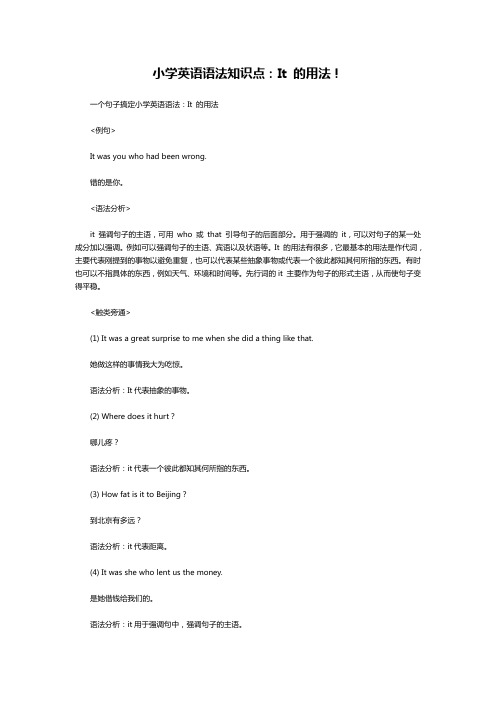
小学英语语法知识点:It 的用法!一个句子搞定小学英语语法:It 的用法<例句>It was you who had been wrong.错的是你。
<语法分析>it 强调句子的主语,可用who 或that 引导句子的后面部分。
用于强调的it,可以对句子的某一处成分加以强调。
例如可以强调句子的主语、宾语以及状语等。
It 的用法有很多,它最基本的用法是作代词,主要代表刚提到的事物以避免重复,也可以代表某些抽象事物或代表一个彼此都知其何所指的东西。
有时也可以不指具体的东西,例如天气、环境和时间等。
先行词的it 主要作为句子的形式主语,从而使句子变得平稳。
<触类旁通>(1) It was a great surprise to me when she did a thing like that.她做这样的事情我大为吃惊。
语法分析:It代表抽象的事物。
(2) Where does it hurt?哪儿疼?语法分析:it代表一个彼此都知其何所指的东西。
(3) How fat is it to Beijing?到北京有多远?语法分析:it代表距离。
(4) It was she who lent us the money.是她借钱给我们的。
语法分析:it用于强调句中,强调句子的主语。
(5) It's beyond me to say why.我无法说个究竟。
语法分析:It作先行词,作句子的形式主语,有平稳句子的作用,句子谓语有这几种:be +形容词或名词,介词短语+不定式,及物动词+宾语+不定式。
<巩固练习>1. _____ says here there was a big fire in the city.2. “Why,____ is you!”she cried.3. _____ takes two to make a quarrel.4. Why is _____ that everyone thinks I'm narrow-minded?5. Was _____ you that broke the window?6. Does _____ itch much?<参考答案>1. It2. it3. It4. it5. it6. it文章来源:北京小升初_虎哥说教;。
小学英语语法知识 I、my、you、your、he、him、she、her、they、them、it、its各种区别用法资料讲解

小学英语语法知识英语 I, my, me, mine的用法:1、I, 代词, 一般做主语, 意思是“我”;用法, 通常作为主语放在句首, 后加动词(包括Be);例: I am a good person. -- 我是一个好人2、me, 代词, 一般做宾语, 意思也是“我”;用法, 通常作为宾语放在句尾, 放在在动词后面;例: Don't hit me. -- 别打我。
3、my, I的所有格形式, 形容词性物主代词,翻译为“我的”;用法, 跟一般形容词一样, 后面加名词;例: He is my brother. -- 他是我的兄弟。
4、mine, I的所有格形式, 代词, 翻译为“我的(东西)”;用法, 可做主语,宾语等等,例: He's a friend of mine (= one of my friends) . -- 他是我的一个朋友。
英语 you、your、yours 有什么区别?1、you 指“你”。
your 指“你的,你们的”you可以直接放在句首做主语,而 your 不能单独使用,必须加上名词使用。
如:you are interesting. 你有趣。
(you直接做主语)your book is interesting. 你的书有趣。
(注意这里your book 才是主语)you可以直接做宾语,而your不可以,必须加上名词使用。
(可以和上面一条比较,只是位置不一样)如:I like you.我喜欢你。
I like your book.我喜欢你的书。
your 你的,你们的yours你的(东西),你们的(东西)your 是形容词性物主代词,后接名词yours名词性物主代词,后面不接名词,相当:your+名词据个例子你就明白了:this is my book and thatis your book.this is my book and that is yours.英语he、him、his有什么区别?首先他们都是代词,但是he是主格人称代词;him是宾格人称代词;his是形容词性的物主代词,他们运用在一个句子的不同地方。
【精品】小学微课堂-小升初英语知识点精讲 指示代词this,that,these,those和代词it的用法

指示代词 this,that,these,
those和代词it的用法
知识1
this 用来指示离说话人比较近的单个人或物; that 用来指示离说话人比较远的单个人或物。
This is a duck.
That is a cow.
知识2
当询问物品的问句中含有this, that等指示 _your watches over there? A.this B.that C.these D.those
【错误答案】 B 【解析】根据句意,你的手表们在那边吗?
over there表示离得远,watch是复数,所
以应用those,而不能用that或these. 【正确答案】D
What’s that this?. It It is is a a duck. cow.
知识3
these 是this的复数形式, 指较近的若干人或事物。
These are ducks.
This is a book.
These are books.
知识4
those 是that的复数形式, 指较远的若干人或事物。
【解析】 those 的单数形式为that,are的单数为is,
根据图画完成句子
1. What’s this? It is an eraser ____________________.
2. Look at _______ stars. A.these B.that C. those 【解析】当询问物品的问句中含有 【解析】 句中使用的star的复数形式 this, stars that ,星星距 等指 示代词,其答语常用 离说话者很远,因此应用 it代替this或 those. that.
小学英语六年级小升初人称代词

What time is it ?
It’s six thirty.
人称代词they 和them
他们
主格
they
她们
它们
宾格
them
练习: 1.他们是学生:__T_h_e_y_a_r_e_s_t_u_d_en_t_s_ 2. __T_h_e_y__(她们) are listening to the radio
It’s _________ A.ours B. hers C. mine D theirs
2.—Where is my pen? Have you seen___? (09
烟台市)
—Oh, sorry. I have taken_____by mistake.
A. it; yours
B. them; his
形容词性物主代词和名词性物主 代词
物主:物体的主人 表示:谁的 我的,你的,他的~~~~~~~
my our your mine ours yours
his her its their his hers its theirs
It’s my card. It’s mine .
It’s his casrd.
Miss Wang teaches__A___ this term.
A. us B our C. ourselves D. we
Give me some water. Tell him the news. This pretty dog is for me . I often write to him.
两者都
三者及
三者以 上都
两者都不
三者及
三者以
Both of my parents are doctors. Both my father and my mother are doctors. Neither of us likes Jay Chou. Neither Lily nor Lucy likes Jay Chou. All of us are here. All of us like to play football. None of us is Japanese. None of us likes to watch TV.
中小学英语语法大全
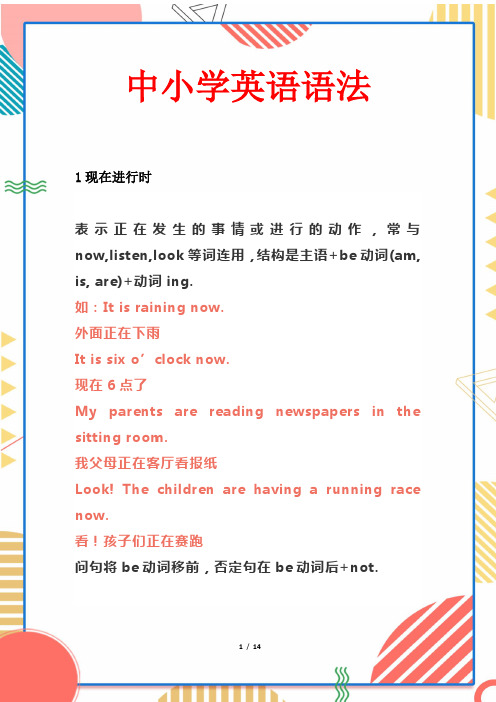
中小学英语语法1现在进行时表示正在发生的事情或进行的动作,常与now,listen,look等词连用,结构是主语+be动词(am, is, are)+动词ing.如:It is raining now.外面正在下雨It is six o’clock now.现在6点了My parents are reading newspapers in the sitting room.我父母正在客厅看报纸Look! The children are having a running race now.看!孩子们正在赛跑问句将be动词移前,否定句在be动词后+not.2一般现在时表示经常反复发生的事情或动作,常与often, usually, sometimes, always, every day(week year…) on Sundays等词连用。
结构是主语+动词原形;当主语为第三人称单数即he,she, it, Tom, my mother, the boy等词时,动词后加s或es.如:We have an English lesson every day.我们每天都要上英语课Do the boys run faster than the girls? Yes, they do.男孩比女孩跑的快吗?是的问句借助于do, does否定句借助于don’t, doesn’t,后面动词一定要还原。
3一般过去时表示发生在过去的事情或存在的状态,常与just now; a moment ago; …ago; yesterday; last ( week; month; year; Monday; weekend); this morning等词连用。
结构是主语+be动词的过去式(was; were)或主语+动词的过去式。
注意:be动词与动词过去式不可同时使用。
如:My earphones were on the ground just now.我的耳机刚刚还在呢。
小学英语语法知识 I、my、you、your、he、him、she、her、they、them、it、its各种区别用法
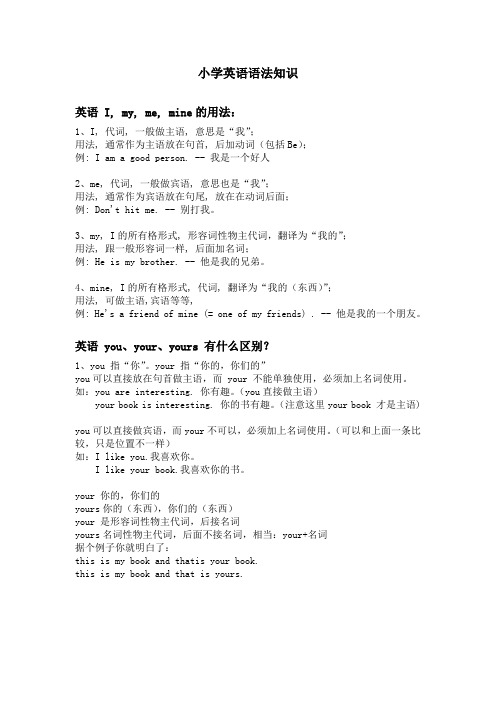
小学英语语法知识英语 I, my, me, mine的用法:1、I, 代词, 一般做主语, 意思是“我”;用法, 通常作为主语放在句首, 后加动词(包括Be);例: I am a good person. -- 我是一个好人2、me, 代词, 一般做宾语, 意思也是“我”;用法, 通常作为宾语放在句尾, 放在在动词后面;例: Don't hit me. -- 别打我。
3、my, I的所有格形式, 形容词性物主代词,翻译为“我的”;用法, 跟一般形容词一样, 后面加名词;例: He is my brother. -- 他是我的兄弟。
4、mine, I的所有格形式, 代词, 翻译为“我的(东西)”;用法, 可做主语,宾语等等,例: He's a friend of mine (= one of my friends) . -- 他是我的一个朋友。
英语 you、your、yours 有什么区别?1、you 指“你”。
your 指“你的,你们的”you可以直接放在句首做主语,而 your 不能单独使用,必须加上名词使用。
如:you are interesting. 你有趣。
(you直接做主语)your book is interesting. 你的书有趣。
(注意这里your book 才是主语)you可以直接做宾语,而your不可以,必须加上名词使用。
(可以和上面一条比较,只是位置不一样)如:I like you.我喜欢你。
I like your book.我喜欢你的书。
your 你的,你们的yours你的(东西),你们的(东西)your 是形容词性物主代词,后接名词yours名词性物主代词,后面不接名词,相当:your+名词据个例子你就明白了:this is my book and thatis your book.this is my book and that is yours.英语he、him、his有什么区别?首先他们都是代词,但是he是主格人称代词;him是宾格人称代词;his是形容词性的物主代词,他们运用在一个句子的不同地方。
小学英语-代词
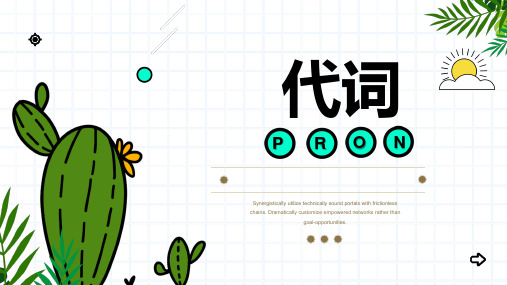
内容讲解
不定代词
1. some和 any 的用法:
(1) some一般用于肯定句中,意思是“几个”、“一些”、“某个”作定语时可修饰可数名词或不可
数名词。some 用于疑问句时,表示建议、请求或希望得到肯定回答。
eg: I have some work to do today.
Would you like some coffee with sugar?
goal-opportunities.
思维导图
02 内容讲解
Synergistically utilize technically sound portals with frictionless chains. Dramatically customize empowered networks rather than
内容讲解
人称 第一人称 第二人称
第三人称 不定人称
反身代词
单数
myself yourself herself himself
itself
复数 ourselves yourselves
themselves oneself
内容讲解
反身代词
1. 反身代词在句子中作宾语表示反射(指一个动作回到该动作执行者本身)。 Eg. Don’t play with the knife. You might hurt yourself. 2.在句子中作同位语表示强调(即用来强调名词或代词的语气)。 Eg. The story itself is good. Only he didn’t tell it well. 3. 熟记“动词+反身代词”构成的习惯用语: ① teach oneself=learn...by oneself 自学 ② enjoy oneself 玩的开心 ③ make oneself at home 别客气 ④ look after oneself = take care of oneself照看自己 ⑤ dress oneself 自己穿衣 ⑥ Help yourself to 自便
小学英语动词第三人称单数形式用法详解

⼩学英语动词第三⼈称单数形式⽤法详解⼀般现在时中的第三⼈称单数形式在⼀般现在时中,当主语是第三⼈称单数时,谓语动词要⽤第三⼈称单数形式,即常在动词原形后加-s或-es。
(⼀)什么是⼀般现在时?⼀般现在时的基本⽤法有哪些呢?【⼀般现在时的功能】1.表⽰事物或⼈物的特征、状态。
如:The sky is blue.天空是蓝⾊的。
2.表⽰经常性或习惯性的动作。
如:I get up at six every day.我每天六点起床。
标志词(时间状语):always, every week (day, year, month…),once a week, every…, sometimes, at…, on Sunday uausllyoften,never,hardly..........3.表⽰客观现实。
如:The earth goes around the sun.地球绕着太阳转。
(⼆)哪些主语是第三⼈称单数? 现归纳总结如下:⼀、⼈称代词he, she, it是第三⼈称单数。
如:He likes watching TV. 他喜欢看电视。
he has lunch at twelve. 她⼗⼆点吃午餐。
It looks like a cat. 它看起来像只猫。
⼆、单个⼈名、地名或称呼作主语;是第三⼈称单数。
如:①Han Mei looks like her mother. 韩梅看起来像她的母亲。
②Beijing is in China. 北京在中国。
③Uncle Wang often makes cakes. 王叔叔经常做蛋糕。
三、单数可数名词或"this / that / the+单数可数名词"作主语时,是第三⼈称单数。
如:①A horse is a useful animal. 马是有⽤的动物。
②This book is yours. 这本书是你的。
③That car is red. 那辆⼩汽车是红⾊的。
小学英语语法知识 I、my、you、your、he、him、she、her、they、them、it、its各种区别用法教学文案
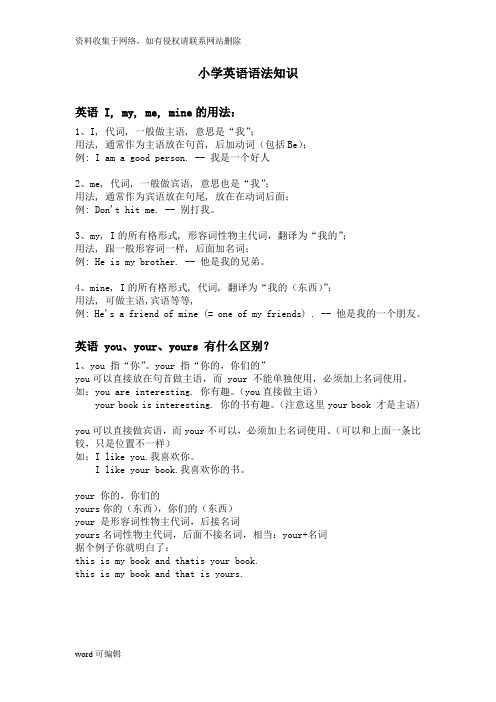
小学英语语法知识英语 I, my, me, mine的用法:1、I, 代词, 一般做主语, 意思是“我”;用法, 通常作为主语放在句首, 后加动词(包括Be);例: I am a good person. -- 我是一个好人2、me, 代词, 一般做宾语, 意思也是“我”;用法, 通常作为宾语放在句尾, 放在在动词后面;例: Don't hit me. -- 别打我。
3、my, I的所有格形式, 形容词性物主代词,翻译为“我的”;用法, 跟一般形容词一样, 后面加名词;例: He is my brother. -- 他是我的兄弟。
4、mine, I的所有格形式, 代词, 翻译为“我的(东西)”;用法, 可做主语,宾语等等,例: He's a friend of mine (= one of my friends) . -- 他是我的一个朋友。
英语 you、your、yours 有什么区别?1、you 指“你”。
your 指“你的,你们的”you可以直接放在句首做主语,而 your 不能单独使用,必须加上名词使用。
如:you are interesting. 你有趣。
(you直接做主语)your book is interesting. 你的书有趣。
(注意这里your book 才是主语)you可以直接做宾语,而your不可以,必须加上名词使用。
(可以和上面一条比较,只是位置不一样)如:I like you.我喜欢你。
I like your book.我喜欢你的书。
your 你的,你们的yours你的(东西),你们的(东西)your 是形容词性物主代词,后接名词yours名词性物主代词,后面不接名词,相当:your+名词据个例子你就明白了:this is my book and thatis your book.this is my book and that is yours.英语he、him、his有什么区别?首先他们都是代词,但是he是主格人称代词;him是宾格人称代词;his是形容词性的物主代词,他们运用在一个句子的不同地方。
小学英语精讲精析 It was my birthday on Saturday
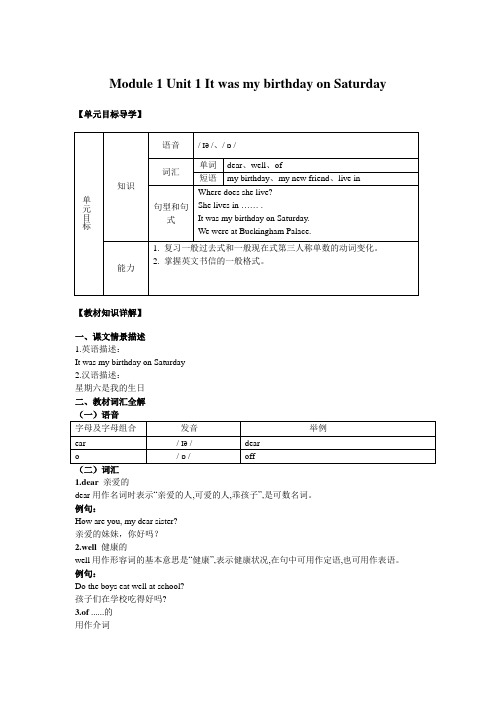
Module 1 Unit 1 It was my birthday on Saturday 【单元目标导学】【教材知识详解】一、课文情景描述1.英语描述:It was my birthday on Saturday2.汉语描述:星期六是我的生日二、教材词汇全解(二)词汇1.dear亲爱的dear用作名词时表示“亲爱的人,可爱的人,乖孩子”,是可数名词。
例句:How are you, my dear sister?亲爱的妹妹,你好吗?2.well健康的well用作形容词的基本意思是“健康”,表示健康状况,在句中可用作定语,也可用作表语。
例句:Do the boys eat well at school?孩子们在学校吃得好吗?3.of ......的用作介词例句:He is friend of mine.他是我的一个朋友。
三、课文内容全译1. London is very cold now. 现在伦敦很冷。
一般现在时肯定句:主语+be(am,is,are)+其它。
例句:I am a boy.我是一个男孩。
2. It was my birthday on Saturday.周六是我生日。
一般过去时肯定句:主语 + be动词的过去式(was, were)例句:He was busy yesterday.他昨天很忙。
【相关话题拓展】一般过去时1. 定义:表示过去某时发生的动作或存在的状态。
结构:“主语+动词的过去式”2. 用法:(1)表示过去某个时间发生的动作或存在的状态。
He was here yesterday.(2)表示过去经常或反复发生的动作。
My mother often went to work by taxi last year.【单元知识总结】【单元测评】一、单选题1. My grandfather usually ___ the flowers in the morning.A. wateringB. is wateringC. watersD.water2. —What are you doing?—I _______the piano. Tomorrow I ______ a test.A. play, will haveB. am playing, will haveC. played, haveD. play, am having3. My mother and I ______our house yesterday.A. cleanB. cleanedC. cleaningD. to clean4. Listen! Xiaoling ______ in her classroom.A. singsB. singingC. is singingD. sing二、完成句子。
滨湖区二小六年级英语上册 Unit 1 It’s time to play the violin第2
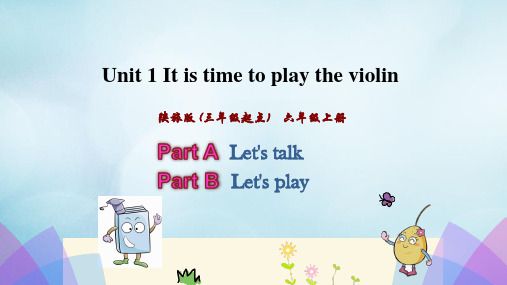
3. Play__s_p_o_r_ts__(做运动) 4. __w_a_t_ch____TV(看电视)
5. have a__re_s_t__(休息一下) 6. __ri_g_h_t__now(立刻,马上)
Байду номын сангаас
7. __g_e_t _up (起床)
8. play the _v_i_o_li_n__(拉小提琴)
例句
My father is writing a letter. 我爸爸正在写信。 My father isn't writing a letter.我爸爸没有写信。 — Is your father writing a letter?你爸爸正在写信吗? — Yes, he is./No, he isn't. 是的, 他在写。/不, 他没有。 — What is your father doing?你爸爸正在做什么? — He is writing a letter. 他正在写信。
last weekend 〔表示过去〕
• She went there by plane.
• She took lots of pictures and went sw imming.
Phrases
• winter holiday:寒假 • summer holiday,暑假 • go over the holiday :去度假 • go over the winter holiday:度寒假 • far from:离......远 • lots of= a lot of 许多 , 大量的 • sounds great 听起来不错 • sometime将来某天\过去某天
例句 My violin is beautiful. 我的小提琴很漂亮。
小学英语人称代词的用法
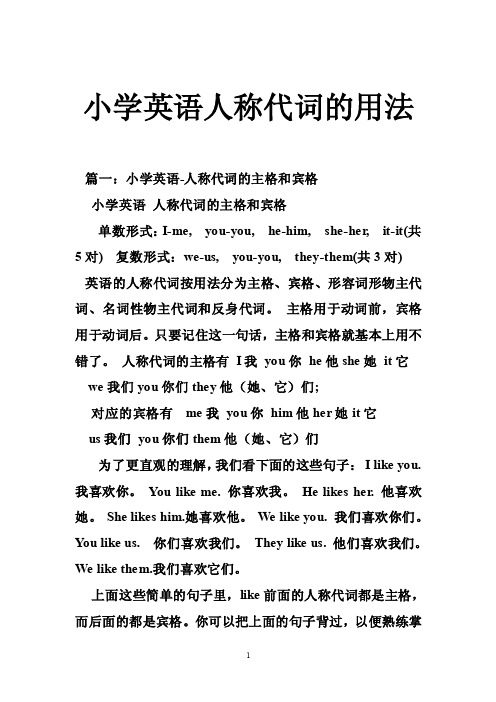
小学英语人称代词的用法篇一:小学英语-人称代词的主格和宾格小学英语人称代词的主格和宾格单数形式:I-me, you-you, he-him, she-her, it-it(共5对) 复数形式:we-us, you-you, they-them(共3对)英语的人称代词按用法分为主格、宾格、形容词形物主代词、名词性物主代词和反身代词。
主格用于动词前,宾格用于动词后。
只要记住这一句话,主格和宾格就基本上用不错了。
人称代词的主格有I我you你he他she她it它we我们you你们they他(她、它)们;对应的宾格有me我you你him他her她it它us我们you你们them他(她、它)们为了更直观的理解,我们看下面的这些句子:I like you.我喜欢你。
You like me. 你喜欢我。
He likes her. 他喜欢她。
She likes him.她喜欢他。
We like you. 我们喜欢你们。
You like us. 你们喜欢我们。
They like us. 他们喜欢我们。
We like them.我们喜欢它们。
上面这些简单的句子里,like前面的人称代词都是主格,而后面的都是宾格。
你可以把上面的句子背过,以便熟练掌握它们的用法。
你也可以把like换成别的动词,比如play with(和??玩)、look at (看着)等等,读着玩玩儿,你认为哪个动词好玩就换成哪个。
形容词性物主代词有:my我的、your你的、his他的、her她的、its它的、our我们的、your你们的、their他们的。
之所以叫它们形容词是因为他们必须放在名词前面。
物主则表示它们是物的主人。
如:我们的老师our teacher、我的汽车my car、你的裤子your trousers、他的风筝his kite、她的椅子her chair、它的腿its legs、你们的学校your school、她们的聚会their party。
小学英语动词第三人称单数形式用法详解

小学英语动词第三人称单数形式用法详解在英语中,动词的第三人称单数形式是指在主语为第三人称单数(he,she,it,以及单数名词)的情况下使用的动词形式。
以下是关于第三人称单数形式的用法详解:1. 一般现在时(Simple Present Tense)在一般现在时中,第三人称单数形式的动词要在原形后加上-s或-es。
例如:- She plays basketball.(她打篮球。
)- He eats an apple.(他吃一个苹果。
)- It runs fast.(它跑得很快。
)2. 带有助动词do/does的疑问句和否定句在带有助动词do或does的疑问句和否定句中,动词恢复到原来的形式,而不加-s或-es。
例如:- Does she play basketball?(她打篮球吗?)- He doesn't eat an apple.(他不吃苹果。
)3.带有情态动词的句子在使用情态动词(can,will,would,should,may等)的句子中,动词也恢复到原来的形式,而不加-s或-es。
例如:- She can swim in the pool.(她可以在泳池里游泳。
)- It may rain tomorrow.(明天可能会下雨。
)4.一些特殊的动词有些动词的第三人称单数形式不是在原形后加上-s或-es。
例如:- have → has(有)- do → does(做)- go → goes(去)- be → is(是)需要注意的是,当主语是第三人称复数时,动词恢复到原形,而不加上-s或-es。
例如:- They play basketball.(他们打篮球。
)- We eat apples.(我们吃苹果。
)。
小学英语语法知识 I、my、you、your、he、him、she、her、they、them、it、its各种区别用法

小学英语语法知识英语 I, my, me, mine的用法:1、I, 代词, 一般做主语, 意思是“我”;用法, 通常作为主语放在句首, 后加动词(包括Be);例: I am a good person. -- 我是一个好人2、me, 代词, 一般做宾语, 意思也是“我”;用法, 通常作为宾语放在句尾, 放在在动词后面;例: Don't hit me. -- 别打我。
3、my, I的所有格形式, 形容词性物主代词,翻译为“我的”;用法, 跟一般形容词一样, 后面加名词;例: He is my brother. -- 他是我的兄弟。
4、mine, I的所有格形式, 代词, 翻译为“我的(东西)”;用法, 可做主语,宾语等等,例: He's a friend of mine (= one of my friends) . -- 他是我的一个朋友。
英语 you、your、yours 有什么区别?1、you 指“你”。
your 指“你的,你们的”you可以直接放在句首做主语,而 your 不能单独使用,必须加上名词使用。
如:you are interesting. 你有趣。
(you直接做主语)your book is interesting. 你的书有趣。
(注意这里your book 才是主语)you可以直接做宾语,而your不可以,必须加上名词使用。
(可以和上面一条比较,只是位置不一样)如:I like you.我喜欢你。
I like your book.我喜欢你的书。
your 你的,你们的yours你的(东西),你们的(东西)your 是形容词性物主代词,后接名词yours名词性物主代词,后面不接名词,相当:your+名词据个例子你就明白了:this is my book and thatis your book.this is my book and that is yours.英语he、him、his有什么区别?首先他们都是代词,但是he是主格人称代词;him是宾格人称代词;his是形容词性的物主代词,他们运用在一个句子的不同地方。
- 1、下载文档前请自行甄别文档内容的完整性,平台不提供额外的编辑、内容补充、找答案等附加服务。
- 2、"仅部分预览"的文档,不可在线预览部分如存在完整性等问题,可反馈申请退款(可完整预览的文档不适用该条件!)。
- 3、如文档侵犯您的权益,请联系客服反馈,我们会尽快为您处理(人工客服工作时间:9:00-18:30)。
中小学英语:“it”用法详解【导语】“it”是一个使用频率相当高的英语单词,您的孩子对此全掌握了吗?下面是我整理发布的“it”用法详解,欢迎阅读参考!更多相关讯息请关注我!一、it作句子的真正主语1.it指前面已经提到过的人或事物,有时指心目中的或成为问题的人或事物,作真正主语。
例如:What’s this?-It is a sheep?这是什么?这是一只绵羊。
Who is it?-It’s me (I).谁??是我。
It’s the wind shaking thewindow.是风刮得窗户响。
2.it指时间、季节。
大凡用在无人称动词的主语。
例如:What time is it?-It’s nine.几点了??九点了。
It’s time for the meeting. Let’s go.开会的时间到了,我们走吧。
What day is today?-It’s Saturday.今天星期几??今天星期六。
What’s the date today?-It is October 1st.今天是几号??今天是十月一日。
What season is it?-It is summer.现在是什么季节??是夏季。
3.it指气候。
大凡作无人称动词的主语。
例如:Is it cold in this room?-No, it isn’t.屋里冷吗??不冷。
What’s the weather like today?-It is fine.今天天气怎么样??是晴天。
It often rains in summer and it often snows in winter in this city.这个城市夏天经常下雨,冬天经常下雪。
4.it指距离、情况等。
大凡用作无人称动词的主语。
例如:It is five kilometers from my home to the school.从我家到学校有五公里。
It is very near from this factory to that one.从这个工厂到那个工厂非常近。
It is a long way to the sea.离海很远。
Is it well with you?你身体好吗?二、it作形式主语动词不定式、动名词短语起、从句在句子中起主语作用,而这一部分用词较多时,可以用it作为形式主语,放在句首代表其后所说的事实上的、真正的主语,而把真正的主语放在后面。
1.It +谓语+动词不定式。
It作形式主语,动词不定式作真正的主语。
例如:It is difficult to climb a mountain.爬山是很艰辛的。
It’s a good habit to do morning exercises.作早操是个好习惯。
It’s important t o do proper memory work in the study ofa foreign language.在学习外语时合适地做一些有助于记忆的练习是很严重的。
It is right to do so.这样做是对的。
2.It+谓语+动名词短语。
It作形式主语,动名词短语作真正的主语。
例如:It is dangerous playing with fire.玩火是危险的。
It is no use learning without thinking.学而不思则罔。
It’s useless ar guing with a silly boy.和笨孩子争论是没有用的。
3.It+谓语+名词性从句。
It作形式主语,以that引导的名词性从句是真正的主语。
例如:It is a pity that you didn’t see such a good film.你没看这么好的电影,真可惜。
It is certain that we shall succeed.我们一定会胜利。
It is strange that nobody knows where he lives.真奇怪,谁也不知道他住在哪里。
(It is strange that…后面可用虚拟语气。
如:It is strange that he should have made such a mistake.他居然犯了这样一个错误,真奇怪。
It is strange that nobody should know where he lives.居然没有人知道他住在哪里,真奇怪。
)It is said that the plane will take off at ten tomorrow morning.据说飞机明天上午十点起飞。
三、it作形式宾语it作形式宾语,代表其后所说的真正的宾语。
真正的宾语是以that引导的名词性从句或不定式短语。
例如:I consider it wrong that you Chinese students learn English without comparing it with yourown language.我认为你们中国学生学习英语,不和你们自己的语言比较是不对的。
I find it not so difficult to learn a foreign language.我发现学习一门外语不那么困难。
I remember I made it clear to you that I was not coming.我记得向你明确表示过我不来。
They want to make it clear to the public that they are doing an important and necessary job.他们要向公众表明,他们在做一件严重而又必要的工作。
四、it用于强调结构在表示强调的结构中,it可用作先行代词,这种结构的句型如下:It +is/was +被强调的部分+that +其他部分。
如果强调的部分是人,可用who, whom代替that.例如:Professor Wang teaches us English every Monday after noon.王教授每星期一下午教我们英语。
强调主语:It is Professor Wang who teaches us English every Monday afternoon.强调间接宾语:It is us whom Prof. Wang teaches English every Monday afternoon.强调直接宾语:It is English that Prof. Wang teaches us every Monday afternoon.强调状语:It is every Monday afternoon that Prof. Wang teaches us English. It was herethat I first met him.这就是我初次与他见面的地方。
(强调状语)It is the people who are realy powerful.翻译练习1)该上课了,快。
It is time for class. Hurry up.2)从这儿到你们学校远吗??不远,大约一公里。
Is it far from here to your school? No, it isn’t. It’s about a kilometer.3)从我家到颐和园去很近。
It is very near from my home to the Summer Palace.4)(天)正在下雨。
It’s raining now.5)电灯是爱迪生发明的。
It was Edison who invented the electric light.6)我认为学习一门外语是很严重的。
I think it important to learn a foreign language.7)他通常一天读两次英语。
He made it a rule to read English twice a day.8)从我家去*广场坐公共汽车大约要一个小时。
It takes about an hour to go from my hometo the Tian’anmen Square by bus.反意疑问句反意疑问句相当于“对不对?”“好不好?”“行不行?”,用yes或no回答。
由两部分组成,前一部分是陈述句,后一部分是附加疑问短语,中间用逗号隔开,所以反意疑问句又叫附加疑问句。
通常的形式是:肯定的陈述句+否定的附加疑问,或否定的陈述句+肯定的附加疑问。
如:He studies English, doesn’t he?He doesn’t study English, does he?They are from America, aren’t they?They are not from America, are they?反意疑问句的主要形式:1.如果主句是be或其他助动词(如can, shall, will等),其反意疑问句用同一助动词。
如:We are late, aren’t we?You haven’t met my wife, have you?He can drive a car, can’t he?They used to have difficulty in just making ends meet, didn’t (usedn’t) they?You’d better eat with knives and forks, hadn’t you?2.如果主语带有seldom, hardly, never, rarely, few, little等否定词或半否定词时,因为主句本身具有否定意义,附加疑问部分的动词用肯定式,如:We seldom go to the cinema, do we?Sue almost never worked, did she?3.如果主句部分是“I am…”结构,由于”am not”没有相应的缩略形式,附加疑问部分大凡用are n’t I代替。
如:I am your friend, aren’t I? I’m late, aren’t I?I am a student, aren’t I?在祈使句中的附加疑问部分大凡用will you, won’t you.4.在祈使句中的附加疑问部分大凡用will you, won’t you.如:Sit down, will you?Have some tea, won’t you?Open the window, won’t you?这种句子可以理解为: Will you do something?如:Will you open the window?注意:否定的祈使句之后,只能用will.如:Don’t forget, will you?Don’t make so much noise, will you?5.以Let’s…开头的祈使句,肯定的用shall we?否定的用all right?或OK?如:Let’s go back to our seats, shall we?Let’s not have hot food this time, OK? (all right?)这种句子可以理解为:Shall we (dosomething?),如:Shall we go back to our seats.这样有助于理解和记忆。
